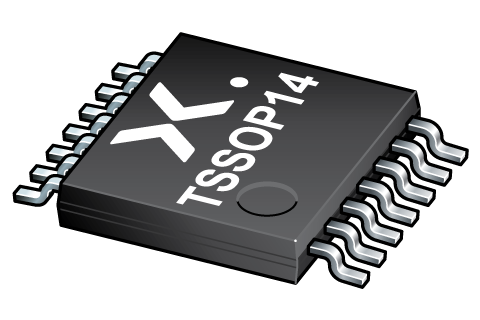Orderable parts
| Type number | Orderable part number | Ordering code (12NC) | Package | Buy from distributors |
|---|---|---|---|---|
| 74HC393PW | 74HC393PW,118 | 935187430118 | SOT402-1 | Order product |

Register once, drag and drop ECAD models into your CAD tool and speed up your design.
Click here for more informationDual 4-bit binary ripple counter
The 74HC393; 74HCT393 is a dual 4-stage binary ripple counter. Each counter features a clock input (nCP), an overriding asynchronous master reset input (nMR) and 4 buffered parallel outputs (nQ0 to nQ3). The counter advances on the HIGH-to-LOW transition of nCP. A HIGH on nMR clears the counter stages and forces the outputs LOW, independent of the state of nCP. Inputs include clamp diodes. This enables the use of current limiting resistors to interface inputs to voltages in excess of VCC.
Wide supply voltage range from 2.0 V to 6.0 V
CMOS low power dissipation
High noise immunity
Latch-up performance exceeds 100 mA per JESD 78 Class II Level B
Complies with JEDEC standards:
Input levels:
For 74HC393: CMOS level
For 74HCT393: TTL level
ESD protection:
HBM: ANSI/ESDA/JEDEC JS-001 class 2 exceeds 2000 V
CDM: ANSI/ESDA/JEDEC JS-002 class C3 exceeds 1000 V
Two 4-bit binary counters with individual clocks
Divide by any binary module up to 28 in one package
Two master resets to clear each 4-bit counter individually
| Type number | VCC (V) | Output drive capability (mA) | Logic switching levels | tpd (ns) | Power dissipation considerations | Tamb (°C) | Rth(j-a) (K/W) | Ψth(j-top) (K/W) | Rth(j-c) (K/W) | Package name |
|---|---|---|---|---|---|---|---|---|---|---|
| 74HC393PW | 2.0 - 6.0 | ± 5.2 | CMOS | 12 | low | -40~125 | 128 | 3.4 | 52.5 | TSSOP14 |
| Model Name | Description |
|---|---|
|
|
| Type number | Orderable part number, (Ordering code (12NC)) | Status | Marking | Package | Package information | Reflow-/Wave soldering | Packing |
|---|---|---|---|---|---|---|---|
| 74HC393PW | 74HC393PW,118 (935187430118) |
Active | HC393 |

TSSOP14 (SOT402-1) |
SOT402-1 |
SSOP-TSSOP-VSO-WAVE
|
SOT402-1_118 |
| Type number | Orderable part number | Chemical content | RoHS | RHF-indicator |
|---|---|---|---|---|
| 74HC393PW | 74HC393PW,118 | 74HC393PW |
|
|
| File name | Title | Type | Date |
|---|---|---|---|
| 74HC_HCT393 | Dual 4-bit binary ripple counter | Data sheet | 2024-03-19 |
| AN11044 | Pin FMEA 74HC/74HCT family | Application note | 2019-01-09 |
| SOT402-1 | 3D model for products with SOT402-1 package | Design support | 2023-02-02 |
| Nexperia_package_poster | Nexperia package poster | Leaflet | 2020-05-15 |
| TSSOP14_SOT402-1_mk | plastic, thin shrink small outline package; 14 leads; 0.65 mm pitch; 5 mm x 4.4 mm x 1.1 mm body | Marcom graphics | 2017-01-28 |
| SOT402-1 | plastic, thin shrink small outline package; 14 leads; 0.65 mm pitch; 5 mm x 4.4 mm x 1.2 mm body | Package information | 2023-11-07 |
| SOT402-1_118 | TSSOP14; Reel pack for SMD, 13"; Q1/T1 product orientation | Packing information | 2025-01-16 |
| 74HC393PW_Nexperia_Product_Reliability | 74HC393PW Nexperia Product Reliability | Quality document | 2025-03-20 |
| HCT_USER_GUIDE | HC/T User Guide | User manual | 1997-10-31 |
| SSOP-TSSOP-VSO-WAVE | Footprint for wave soldering | Wave soldering | 2009-10-08 |
If you are in need of design/technical support, let us know and fill in the answer form we'll get back to you shortly.
The Nexperia Longevity Program is aimed to provide our customers information from time to time about the expected time that our products can be ordered. The NLP is reviewed and updated regularly by our Executive Management Team. View our longevity program here.
| File name | Title | Type | Date |
|---|---|---|---|
| SOT402-1 | 3D model for products with SOT402-1 package | Design support | 2023-02-02 |
| Model Name | Description |
|---|---|
|
|
| Type number | Orderable part number | Ordering code (12NC) | Status | Packing | Packing Quantity | Buy online |
|---|---|---|---|---|---|---|
| 74HC393PW | 74HC393PW,118 | 935187430118 | Active | SOT402-1_118 | 2,500 |
|
As a Nexperia customer you can order samples via our sales organization.
If you do not have a direct account with Nexperia our network of global and regional distributors is available and equipped to support you with Nexperia samples. Check out the list of official distributors.
The interactive datasheets are based on the Nexperia MOSFET precision electrothermal models. With our interactive datasheets you can simply specify your own conditions interactively. Start by changing the values of the conditions. You can do this by using the sliders in the condition fields. By dragging the sliders you will see how the MOSFET will perform at the new conditions set.